Saguaros, Chiliburgers, and Rains of Gold
Several years ago, when my parents still lived in their beautiful Macondray Lane flat, my father and a man named Paul Robinson, who was visiting from Tucson, struck up a conversation. The marvelous upshot of that chat on a street in San Francisco was an agreement to rent the flat to Paul and his wife Leslie while Dad and Mother summered in Squaw Valley. Every June Dad mailed Paul the key to the apartment; at the end of July Paul dropped it back through the mail slot for the Ps to pick up on their return.
When Dad’s health began to falter, and the Parents moved to be closer to family in Nevada City, I picked up the rental arrangements, and came to look forward to my annual phone call from Paul. He and Leslie loved the Lane—they called it their Shangri La. Even after Leslie passed away, of cancer, Paul has continued to make his annual pilgrimage to Macondray Lane.
Two summers ago, Paul and I realized I’d be in the City while he was—I would be recording a few of my tunes in a friend’s studio—and he was just as charming across a café table as he was over the phone. Paul took an active interest in my music, and in a “nothing-ventured” gamble, as I began to arrange this Water Dragon tour, I asked if he might be willing to host a house concert. To my delight, even though he’d never done anything of the kind before, he was game.
With the help of Mrs. Snow, Maggie and I found our way to Paul’s house and met his lovely new sweetheart, Lucette Barber, and his son Keith, a poet. We determined a configuration of the furniture for the gratifyingly large number of people who’d responded to his invitation for what he’d dubbed the “Sands & Maggie Show.” We headed out to a delicious dinner at the delightful La Cocina, and after a margarita and fish tacos followed Luce back to her house, where we were to sleep.
What a house! We felt as if we’d landed in our own Shangri La. Lovely works of art abound, and there is a cat named Fanny and a rescued greyhound named Carter.
We were already fairly charmed by our lovely hostess, but Luce cinched our affections when we asked her what on earth those strange and lovely things were on the table.
“Well, a friend gave me some artichokes,” she said, “but I didn’t cook them quite soon enough and they were looking a little old, so I put them in the compost. A few days later I went to add some coffee grounds to the bucket, and there they were, looking just like that. I had to pull them out—they were so beautiful.”
We sat up for awhile with a glass of wine, sharing stories and laughter. In the morning, Luce, responding to our desire to get a closer look at the Saguaros, took us to Sabino Canyon, where grow thousands of the tall, multi-armed cacti we’d seen only fleetingly through Rogue’s windows as we sped towards Rio Rico.
We were just in time to catch the tram that wends its way up the canyon, passing through what is essentially forests of Saguaros.
The tram’s driver told us that Saguaros are capable of living for hundreds of years.
They don’t sprout their first “arm” until they are 65. In the rainy season, they can soak up enough moisture to endure four years of drought.
So as Paul and Keith, back in their living room, moved couches and set up chairs and put out cheese and wine, Luce and Maggie and I twisted and turned in our tram seats, peering this way and that, trying to take in the beautiful canyon.
One can hop off the tram at any time. About halfway back down we did that, wanting to get closer not only to Saguaros but to some of the other fascinating plants of the region. Such as prickly pear, the staghorn cactus and the Yucca, also called century plant as it blooms so rarely.
Tucson suffered its hottest day on record that day, and even though it was just 11:00 a.m. we were practically prostate with heat stroke by the time we sank into chairs in the air-conditioned visitor’s center.
On our return from Sabino Canyon Maggie jumped in the pool and we had a bit of lunch, after which we set up in Luce’s kitchen and worked on our music for a few hours before heading to Paul’s. The living room had been transformed into a veritable concert hall, and at 7:00 the doorbell started to ring. The space was soon filled with a generous crowd that responded beautifully to our music. While we all had cameras, we forgot to take pictures. However, Keith videotaped both sets, and I’ll see if I can wrap my head around editing a bit of it to post. It was a fabulous night.
Saturday morning, after a final cup of coffee with Luce
and breakfast with Paul
we said our reluctant goodbyes.
We had a long day ahead of us—it would be at least an eight-hour drive to Santa Fe. Before we left Rio Rico, we’d looked in Tracy’s bookshelves for a book we could borrow and read aloud as we drove, and settled on Villasenor’s Rain of Gold, which I’d never read, though Maggie had—she adapted a portion of it, one of many plays-with-music she’s written over the years, and it was performed at the Marsh Theatre in 2005.
The book had come up in conversation during our walk along the Fence, and it seemed a perfect choice for the long arid drive that would take us through landscape that is just as Mexican as it is American. With great Books-on-Tape flourish, Maggie launched us into the story. I was absolutely enthralled—the hours soared by.
Tracy had encouraged us to be sure to stop for a green chiliburder in Hatch, New Mexico, the “Chili Capitol of the World” and we set our sights on that as a good resting spot for a late lunch. As we neared Hatch, Maggie browsed her Droid (we are constantly amazed at the reception available in the most uninhabited of places) for the name of a place to have that chiliburger. Sparkys Barbecue came right up.
“Hmm,” Maggie said. “Cool. Looks like they have music there.” She clicked around on her phone for a while. “Sands.” Her voice was full of laughter. “They have an open mic. Saturdays, between 1:00 and 4:00.”
We both looked at the car’s clock: 2:57.
’Leaning Into Loneliness,’ Maggie said.
I nodded. “And ‘Rustler’s Moon.’ And ‘Night Rider’s Lament’.”
But the stage was empty, and a final band just packing up when we arrived. It was not 3:00 but 4:00—we’d forgotten the time shift at the New Mexico border. A bit glum, we ordered our chiliburger, and Maggie, on her way back from the bathroom, veered over to talk to the men around the stage. In seconds I could see that she’d told them of the grand coincidence of an Open Mic and Rogue full of instruments. She came to the table beaming. “They want us to play.”
Jerry and the owner of Sparkey’s, Teako, set us up with vocal and instrument mics, although there were so few people that even in the big room we probably could have done an acoustic set. On either side of the stage little colored lights strobed away, lighting us in blue and red and yellow and green.
And we did, grinning like maniacs as Maggie played the bluesy riff that launches us into “Leaning Into Loneliness”:
Leanin’ into loneliness
With my elbows on the bar
Sipping from a shot glass
Wondering where you are
As we sang, people filtered in from outside, and from the other part of the restaurant. Maggie does such a great job on “Night Rider’s Lament,” and out here in the Southwest “Rustler’s Moon” is a special pleasure to sing. Our tiny crowd begged for one more and after a brief conference, Maggie and I decided on “Dancin Through the Heavens.”
I believe in distance
But I was afraid of space
The ebb and flow
The come and go
Until I saw your face
I tend to push the rhythm on this as we get into the wild instrumental break, and Maggie and I kept are eyes locked, hers alight with a joy that I’m sure also radiated from mine, and we lashed on through on tempo and in rhythm, turning back to our mics for the final chorus and the high emphatic harmonies that end the song:
Cause we’re dancing through the heavens
Swinging through the stars
Holding onto moonbeams
Loving you that’s how things are
Teako offered us a new chiliburger, as ours had gotten cold, as well as anything else we might like to eat or drink—on the house. He wanted to know if we culd play next Wednesday, or any other time, when were we passing through again? We had to say our route wouldn’t bring us back, not this year, anyway. He sat with us as we ate, describing his love of music, and how what had just happened—traveling musicians showing up to play a set—was exactly his dream. Teako is clearly a lovely soul and Sparkey’s a terrific family-run operation. If you are ever even close to Hatch, New Mexico, we can’t encourage you strongly enough to stop by for some delicious food and great music.
All of this had made us quite late—especially as we’d misjudged that extra hour. Around 5:30 we clambered back into Rogue and galloped towards Santa Fe. Uuntil the setting sun made reading impossible, a few more chapters of Rain of Gold helped the miles fly by.
Speaking of Rains of Gold: Our short set, in front of our little audience, garnered us $12 in tips.

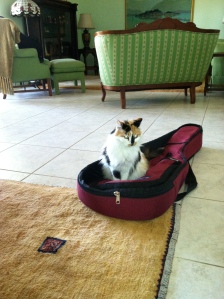




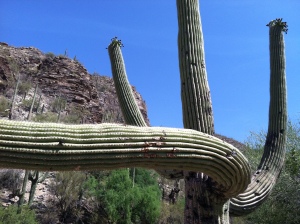

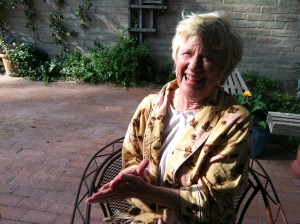
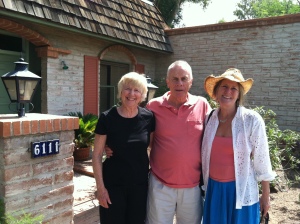

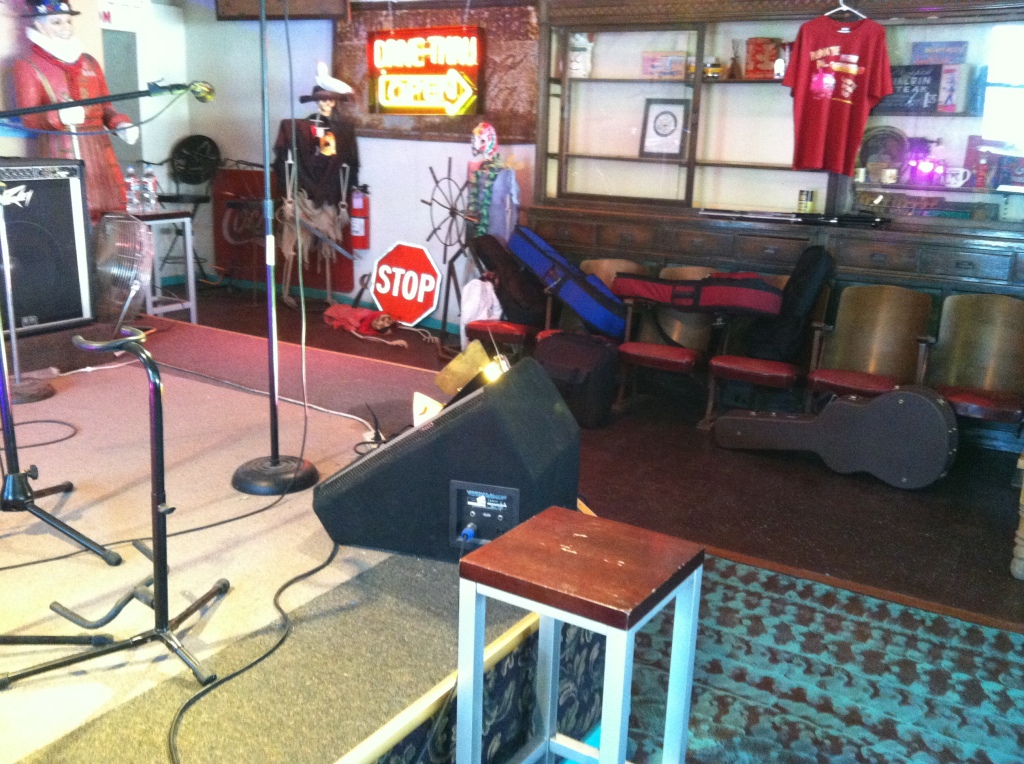
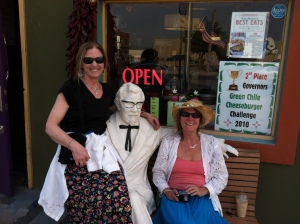

Mudita